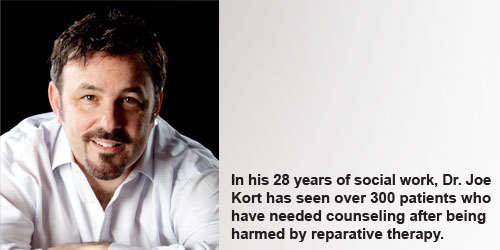
Reparative therapy is the idea that one can become straight through counseling and prayer. This practice has been recently banned for minors in California, and a New Jersey lawsuit filed last month is seeking damages against an organization that claims counseling can "cure" people of same-gender attraction. The California ban will have to play out in the court system, as two different judges made contradictory rulings in cases against the ban.
In Michigan, groups like Reconciliation Ministries (formerly part of Exodus), and Courage (which has eight chapters in Michigan) continue to teach that one can simply "pray away the gay" or that by suppressing their homosexual urges they will be better loved by God.
Reparative therapy can range in aggressiveness from counseling and group therapy that embraces gays as sinners and shepherds them with a loving mask towards repentance, to the hard-lined hellfire and damnation approach to conversion. There are even instances where physical behavior modification techniques are used. In his 28 years of social work, Dr. Joe Kort has seen over 300 patients who have needed counseling after being harmed by reparative therapy.
"In California they're stopping these treatments for teenagers because they're using electrical shock therapy, behavior modification like giving them injections to make them feel ill. They'll show pictures of the same gender and shock them so they'll associate their attraction with the shock. None of them do this therapy without religion…I help people understand that what they suffered is religious abuse. Just growing up gay is traumatic. They are bombarded with harmful images their whole lives. I help them see how their views have been shaped by society and their experience," Kort said.
Kort said reparative therapy movements try to attract people when they are young, and get them "hooked" by preying on them emotionally and making them feel guilt, shame and confusion. "This is not healthy for anyone. It is spiritual abuse."
"I've read this stuff and what they do is focus on words that make people feel shame and disgust. Here's what these people say: 'Don't tell us we're anti-gay. There's nothing gay about being a homosexual.' All this literature focuses only on negative words, and even the word gay is too positive for them."
The Michigan Project for Informed Public Policy uses "sound psychological and other social science research to inform public policy." Project director Dr. Judith Kovach said that while her organization must remain neutral about specific legislation, they are able to shed light on the research behind reparative therapy so that legislators and the public can be aware.
"There is a concern that, with the negative attention this type of 'therapy' has received, reparative therapists will continue their techniques under a different label. Often, reparative therapy is practiced by unlicensed individuals and religious practitioners and clergy," Kovach said. "The ban on reparative therapy in California is a positive step in removing discrimination from the catalog of psychotherapy for youth, but this is a very difficult thing to do. Because reparative therapy is based on the anti-scientific claim that any non-heterosexual sexual orientation is problematic, we do not consider it a treatment or form of psychotherapy at all. Reparative therapy has also failed for decades to yield the outcomes that it claims to provide, and research has found that it can be harmful. Religious practitioners, who are not acting as mental health professionals, may also continue these practices without penalty from this law."
The Southern Poverty Law Center has identified 70 reparative therapists across the country who advertise conversion services. "People who have undergone conversion therapy have reported increased anxiety, depression, and in some cases, suicidal ideation. The devastating consequences of conversion therapy are why the Southern Poverty Law Center is dedicated to ending this practice and defending the rights of individuals harmed by it," the group's webpage says.
Learn more about MPIPP at http://mpipp.org/. Learn more about Dr. Joe Kort at http://www.joekort.com/.










